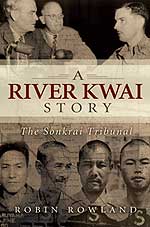Here's my answer to the review in The Times of Brian MacArthur's Surviving the Sword.
It's usually not advisable to take on a reviewer, but Allan Massie's review was so grossly inaccurate that I decided to write a letter to The Times.
Link to the review.
The advantage of blogging is that if the letter isn't published (perhaps because I sent it about 5 weeks after the review appeared) that I can reproduce it here.
The EditorOne example: Australian Brigadier General Arthur Blackburn, testifying at the Tokyo War Crimes trial on Wednesday 4, 1946, said: "I was frequently informed by Japanese officers that the policy of the Japanese government was to treat prisoners only under their principle of "Bushido;" that the principles of the Geneva Convention would be applied only when it suited them and that prisoners of war had no rights whatever." (Page 11,530)
The TimesAs the son of a former British prisoner of war on the Railway of Death (Lt. Fred Rowland, MC, RA) I found The Time's review of Brian MacArthur’s Surviving the Sword (Feb. 19) seriously flawed by what appears to be, in the case of the reviewer, Alan Massie, a story of a little knowledge being a dangerous thing.
Mr. Massie says that author Laurens van der Post promoted the idea that “the Japanese code of Bushido taught that it was shameful to surrender rather than die in battle, this, to their mind, justified their brutality towards their prisoners” and Mr. Massie claims that this idea is “bunkum.”
In fact, Brian MacArthur is absolutely correct about the Japanese attitude, but that idea did not come from Laurens van der Post or other prisoner memoirs, but from day after day of testimony at the International Military Tribunal for the Far East (the Tokyo War Crimes trial) and the trials held by the British in Singapore and by the United States in Yokohama.
I studied those trials for a Master’s Degree for Law and History at York University in Toronto.
The Japanese Army Senjinkun or Field Service Code told soldiers: “You shall not undergo the shame of being taken alive. You shall not bequeath a sullied name” and thus surrendering was a violation of code of bushido, as interpreted by the Japanese of the time. The trial of the major defendants in Tokyo plus the “minor” trials of Japanese and Korean guards for keeping prisoners in “inhuman conditions” showed time and time again that their attitude and brutality was governed by their contempt for prisoners who had surrendered in violation of bushido.
As for Massie’s contention that the Japanese meekly surrendered, that is best answered by what General Tomoyuki Yamashita, the "Tiger of Malaya" told his American defence lawyers at the time of his trial in Manila. When asked why he surrendered, Yamashita replied that the Emperor Hirohito had ordered the army to surrender and he had obeyed the orders of the Emperor, just as he had when he was given command of the campaign to take Singapore.
Robin Rowland
Toronto, Canada
Permanent link to original blog post on March 22 on Surviving the Sword.
Link to my Sonkrai Tribunal page, with information on my academic papers.
Getting Surviving the Sword
In Canada, order Surviving the Sword from Amazon.ca
UK/Canada edition, now available (published March 29, 2005.)
Surviving The Sword: Prisoners Of The Japanese 1942-45
U.S. Edition, available in June
Surviving The Sword: Prisoners Of The Japanese 1942-45
In the United States, order either the UK/Canada edition of Surviving the Sword (March 29) or US edition (June 2005) from Amazon.com.




